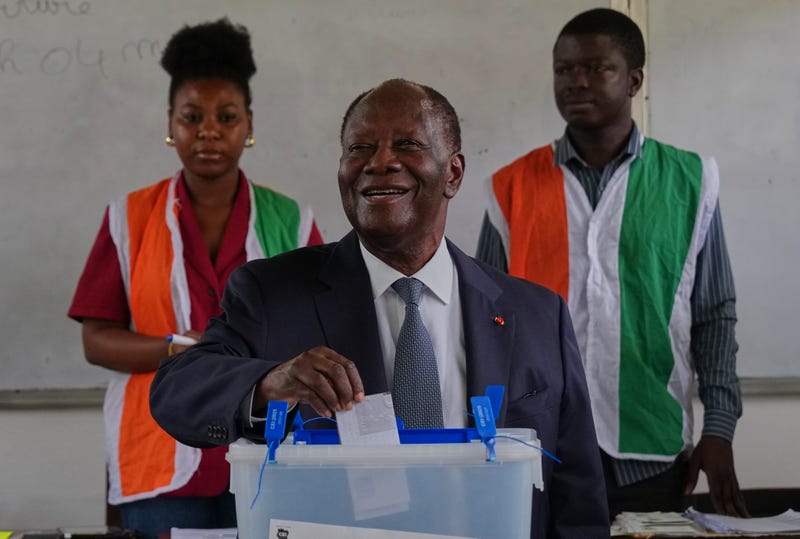
ABIDJAN, Ivory Coast (AP) — Voters in Ivory Coast cast ballots Saturday to elect a new leader as longtime President Alassane Ouattara seeks a fourth term, while his key contenders were barred from the race.
The election is the latest example of aging men continuing to hold power in Africa, which boasts the youngest population in the world. Cameroon’s Paul Biya, 92, Uganda’s Yoweri Museveni, 81, and Equatorial Guinea’s Teodoro Mbasogo, 83, are some other older African leaders still in power.
Five candidates are jostling for Ivory Coast’s top job, but many see Ouattara, the 83-year-old leader of the world’s biggest producer of cocoa, retaining his seat. If he wins, he will extend his rule to almost two decades. Ouattara’s party, the Rally of Houphouetistes for Democracy and Peace, or RHDP, also holds a majority of seats in parliament.
Ouattara has overseen the country’s economic reconstruction since the civil war, achieving an annual growth rate of 6% backed by a boom in cocoa. However, 37.5% of the country’s 30 million people still live in poverty, and jobs are scarce for young people.
Ouedraogo Issiaka, a scrap metal dealer in the capital of Abidjan, said he is voting to “show my love and support” to Ouattara and his ruling party. “But I understand those who wanted to support someone else and didn’t vote,” said Issiaka, 45, referring to supporters of opposition candidates barred from contesting.
Ballot stations opened shortly after 0800 GMT following initial delays. Some 8.7 million people registered to vote. There appeared to be a low turnout of voters in many ballot stations hours after voting commenced, according to Associated Press reporters on-site. The country’s last two elections saw a voter turnout of slightly above 50%.
After voting in the suburb of Cocody in the capital city, Ouattara said he expects provisional results by Sunday.
“It is really important to vote, especially to vote for your president. It is a vote of trust. You have to do this in peace, the Ivorian leader said.
Allegations of opposition clampdown
The buildup to the election has been marred by protests against the exclusion of major candidates who could pose a challenge to Ouattara. The final list of registered candidates did not include Tidjane Thiam, a former Credit Suisse executive, and Laurent Gbagbo, a former candidate who still retains the support of a large section of voters.
Their supporters had taken to the streets, with several hundred people arrested. The crackdown has raised the specter of past electoral crises that left at least 3,000 people dead in 2010 and 2011, and almost 100 in 2020.
The disqualification of the key opposition candidates cast doubts on the credibility of the vote. Opposition supporters have accused the Independent Electoral Commission of working in favour of the ruling party.
Ouattara has denied a crackdown on the opposition. He has attracted less scrutiny from the international community and from longtime partner and former colonial ruler France.
“The geopolitical context is favorable to him,” said Séverin Yao Kouamé, a research professor at the country’s University of Bouaké, noting other international priorities.
The candidates
Four candidates challenge Ouattara, including Simone Gbagbo, a former first lady, and Jean-Louis Billion, a former commerce minister under Ouattara. They have all promised jobs and new agricultural policies. Analysts have said none has any strong chance of winning.
At his final rally in Abidjan on Thursday, Ouattara told his supporters: “The growth has been huge, but we need to continue.”
A former deputy managing director at the International Monetary Fund, Ouatarra’s investment in the public sector and infrastructure has endeared him to his supporters.
Vote counting will begin immediately after the polls close.
—
Asadu reported from Abuja, Nigeria.